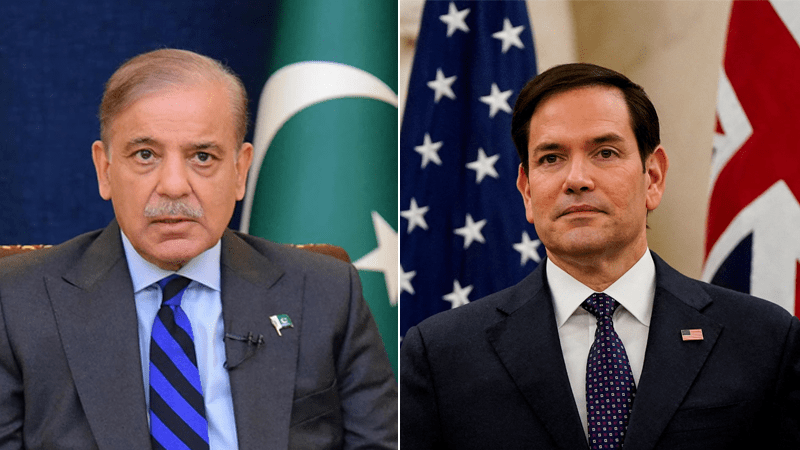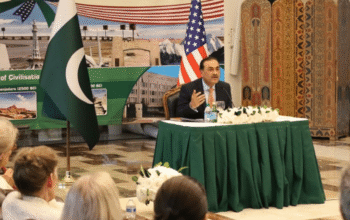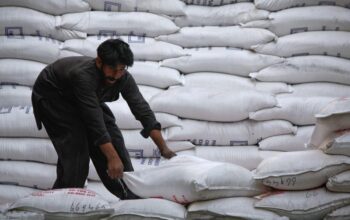By Staff Reporter
ISLAMABAD: Prime Minister Shehbaz Sharif on Friday urged a diplomatic push to ease the intensifying military clash between Iran and Israel during a Friday phone call with U.S. Secretary of State Marco Rubio, as airstrikes and missile volleys threaten to ignite a broader Middle East war.
The call, which also touched on US-Pakistan relations and regional security, came as tensions soared following Israel’s strikes on Iranian nuclear sites and Iran’s retaliatory barrage. The latest flare-up began last Friday when Israel bombed Iranian nuclear and military sites, killing several senior commanders and nuclear scientists. Iran hit back with missile strikes that inflicted heavy damage inside Israel.
The Israeli operation came as Iran was negotiating with the United States over its nuclear program, a process now overshadowed by Washington’s backing of Israel’s stance that Iran “could not be allowed to develop nuclear weapons.”
While speculation swirls about deeper US involvement, President Donald Trump’s administration has not signaled its next move.
Sharif’s office, in a statement after the call, said the prime minister spotlighted the Middle East crisis.
“The situation in the Middle East, particularly the Iran-Israel crisis, was also discussed, where the Prime Minister emphasised on the need to find a peaceful resolution to this grave crisis, through dialogue and diplomacy,” the statement said. “He stated that Pakistan was ready to play a constructive role in any effort for peace in the current situation, which was deeply worrying, not only for the region, but for the entire world.”
The call followed a White House meeting earlier this week between Trump and Pakistan’s army chief, Field Marshal Syed Asim Munir, which also touched on the Middle East turmoil.
Sharif office described that discussion as “most cordial and productive” during the PM talk with Rubio.
The premier also thanked Rubio for US efforts in securing a ceasefire between Pakistan and India last month, after a tense four-day military standoff between the nuclear-armed neighbors.
“He praised the President for his bold leadership and appreciated Secretary Rubio’s proactive diplomacy that played a pivotal role in helping Pakistan and India to arrive at a ceasefire understanding and averting a major catastrophe between the two nuclear armed states,” the statement said.
Trump’s recent warm remarks about Pakistan, Sharif argued, had opened a path “for a more durable peace in South Asia,” achievable only through “meaningful dialogue” with India. “He reaffirmed Pakistan’s willingness for talks with India on all outstanding issues, including Jammu & Kashmir, the Indus Water Treaty, trade and counter-terrorism.”
Rubio praised Pakistan’s commitment to the ceasefire and urged it to keep fostering regional stability, citing its “excellent ties with Iran.” Both leaders agreed to turn their discussions into “tangible actions across all areas.”
Security cooperation was another discussed and Sharif vowed to tackle Pakistan’s militant threats, including from the Tehreek-e-Taliban Pakistan (TTP), the Balochistan Liberation Army (BLA), and other groups behind recent attacks. “In this regard, Secretary Rubio appreciated Pakistan’s counter-terrorism efforts and assured Pakistan of full cooperation by the U.S. in countering all such threats,” the statement added.
Sharif pitched broader collaboration in trade, investment, energy, mining, rare earth metals, and technology, stressing “mutually beneficial cooperation.”
He underscored the value of regular high-level contact to sustain positive US-Pakistan momentum, renewing his invitation for Trump to visit Pakistan and extending one to Rubio, who welcomed the chance to deepen ties across “all areas of shared interest.”
“Thanking the Prime Minister for receiving his telephone call, Secretary Rubio shared his desire to enhance bilateral cooperation between Pakistan and the US, across all areas of shared interest,” the statement said. “He also appreciated Pakistan’s resolve to uphold the ceasefire understanding with India, as well as its sustained efforts for peace in the region. In this context, he encouraged Pakistan, which enjoys excellent ties with Iran, to continue playing its role in the ongoing peace efforts with Iran.”
Meanwhile, Pakistan has pressed the United Nations Security Council (UNSC) to step up. The country’s UN envoy declared that “dialogue and diplomacy in full adherence to the principles of international law and the UN Charter remain the only viable path to resolving this crisis,” urging the council to back the secretary general’s plea for a halt to fighting.
He argued the UNSC must “stop the aggression and hold the aggressor accountable,” condemning Israel’s attacks on Iran since June 13 as violations of international law and calling for a ceasefire before the conflict engulfs the region.
The envoy demanded a “clear denunciation” of strikes on IAEA-safeguarded nuclear facilities, citing breaches of UNSC and IAEA resolutions, the UN Charter, and the Geneva Conventions. Pakistan’s UN Ambassador Ahmad expressed solidarity with Iran, stating, “We offer our sincere condolences and sympathies to the brotherly people of Iran on the loss of life as a result of these unprovoked attacks.”
He decried the “deplorable” humanitarian toll, insisting that “international humanitarian law must be complied with by both sides,” and called the nuclear facility attacks “deeply troubling.”
Copyright © 2021 Independent Pakistan | All rights reserved




